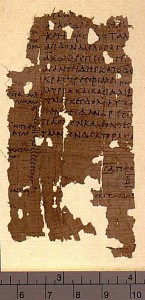 Greek poet Theognis lived around the sixth century BC and is generally thought of in the same vein as Homer and Hesiod as one of the earliest writers to whom we can ascribe specific works. Indeed, Theognis can be considered one of the first lyric writers who were actually concerned how their works would last in the years to come.
Greek poet Theognis lived around the sixth century BC and is generally thought of in the same vein as Homer and Hesiod as one of the earliest writers to whom we can ascribe specific works. Indeed, Theognis can be considered one of the first lyric writers who were actually concerned how their works would last in the years to come.
As with many of his compatriots, it is often difficult to put together a coherent history of the poet but he has provided us with an interesting and informative insight of Greek aristocracy at the time. Some of the poetry assigned to him is autobiographical, or at least thought to be, and most experts date his work to the middle of the sixth century BC and he is generally considered to have been born in Megara in Sicily.
Theognis has been considered to be one of the great ancient moralists though Socrates himself often considered him a sophist who could not be trusted in the teachings that his verses expounded. He was no doubt a man of good standing in Athens who was deeply concerned about the political ructions that were going on at the time.
His overall reputation for moralizing may well have caught the eye of both Plato and Aristotle which could have contributed to the reason for his work lasting beyond the Byzantine period. The aristocracy of Greece regularly attended what were called symposia but which were, in fact, glorified drinking parties where the members could make fun but explore important issues at the same time.

Most of work that survives to this day which is attributed to Theognis is classed as archaic elegiac which was the more flexible way of producing verses and was highly suited to arenas such as the aristocratic symposia. There wasn’t much in the way of experimentation in his work, Theognis was generally happy to follow the excepted ways of writing and often imitated the phrases of Homer.
There is no particular structure to the Theognis works, most of them are couplets that explore a variety of themes from drinking to friendship and war and politics. Whether all the works do in fact belong to the same author has been the subject of debate over the years and no one is quite sure who settled on the final assigning of verses to this single writer.

The first critic to carefully examine the works and separate them out was probably Friedrich Gottlieb Welcker in the early part of the 19th Century. More recently, Martin West has identified a series of core versus that can be considered to be reliably assigned to Theognis. Even the eminent philosopher Friedrich Nietzsche took an interest in the work of the Greek master, studying his poetry in Leipzig where he wrote his first article on the subject.
There’s no doubt that to this day, academics and theologians continue to examine the work of this eminent Greek poet. Not much may be known about the actual life of Theognis but his words still hold meaning and invite discussion in the modern age.

